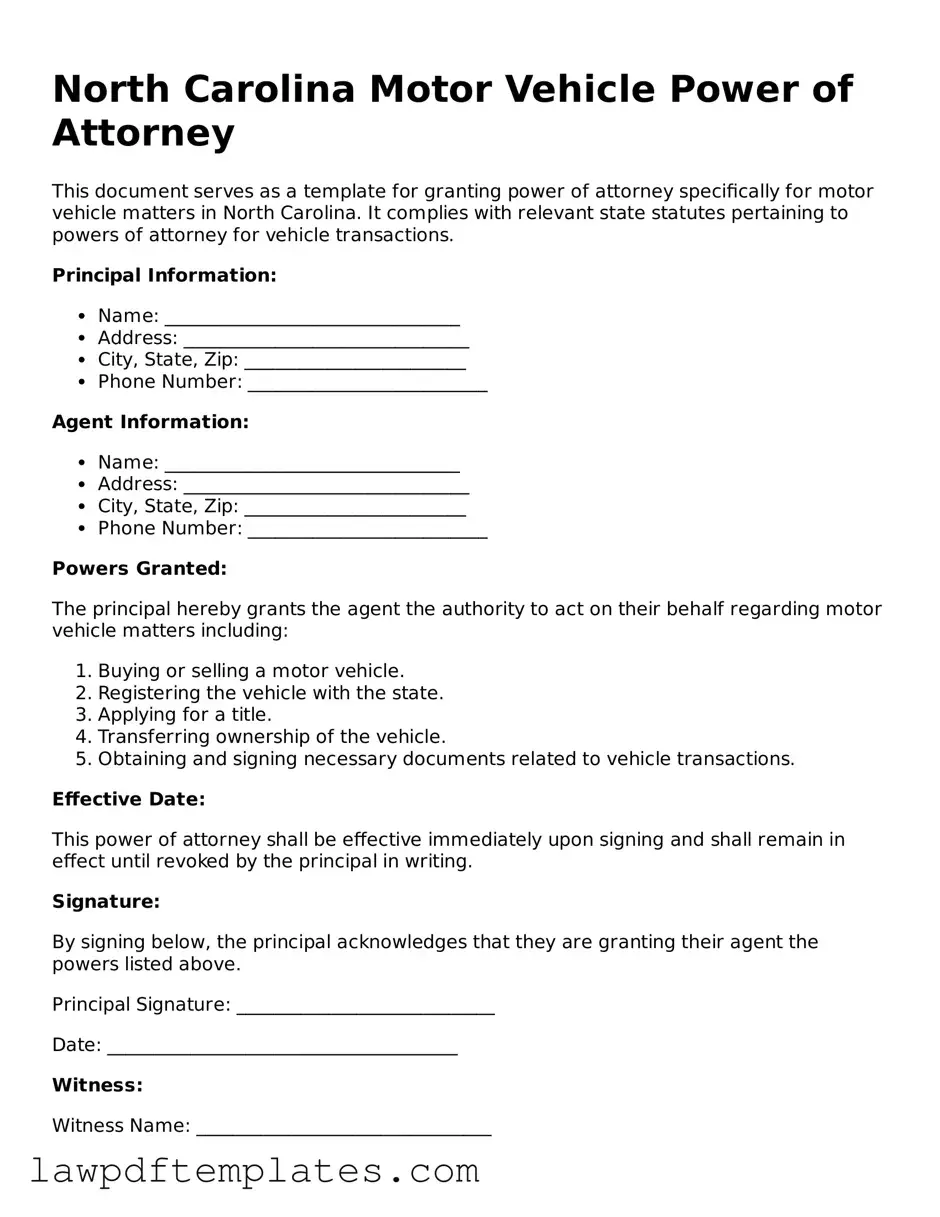Free Motor Vehicle Power of Attorney Template for the State of North Carolina
Form Breakdown
| Fact Name | Description |
|---|---|
| Purpose | The North Carolina Motor Vehicle Power of Attorney form allows an individual to authorize someone else to handle motor vehicle transactions on their behalf. |
| Governing Law | This form is governed by North Carolina General Statutes, specifically Chapter 20, which covers motor vehicles. |
| Signatures Required | Both the principal (the person granting authority) and the agent (the person receiving authority) must sign the form. |
| Revocation | The Power of Attorney can be revoked at any time by the principal, provided that the revocation is in writing. |
| Use Cases | This form is commonly used for tasks such as transferring title, registering vehicles, and obtaining license plates. |
Sample - North Carolina Motor Vehicle Power of Attorney Form
North Carolina Motor Vehicle Power of Attorney
This document serves as a template for granting power of attorney specifically for motor vehicle matters in North Carolina. It complies with relevant state statutes pertaining to powers of attorney for vehicle transactions.
Principal Information:
- Name: ________________________________
- Address: _______________________________
- City, State, Zip: ________________________
- Phone Number: __________________________
Agent Information:
- Name: ________________________________
- Address: _______________________________
- City, State, Zip: ________________________
- Phone Number: __________________________
Powers Granted:
The principal hereby grants the agent the authority to act on their behalf regarding motor vehicle matters including:
- Buying or selling a motor vehicle.
- Registering the vehicle with the state.
- Applying for a title.
- Transferring ownership of the vehicle.
- Obtaining and signing necessary documents related to vehicle transactions.
Effective Date:
This power of attorney shall be effective immediately upon signing and shall remain in effect until revoked by the principal in writing.
Signature:
By signing below, the principal acknowledges that they are granting their agent the powers listed above.
Principal Signature: ____________________________
Date: ______________________________________
Witness:
Witness Name: ________________________________
Witness Signature: ___________________________
Date: ______________________________________
Notarization:
State of North Carolina
County of ________________________
Subscribed and sworn to before me, this _____ day of ______________, 20__.
Notary Public Signature: ___________________________
My commission expires: ___________________________
Common mistakes
Filling out the North Carolina Motor Vehicle Power of Attorney form can be straightforward, but many people make common mistakes that can lead to complications. One frequent error is failing to provide complete information. When the required details, such as names and addresses, are missing or incorrect, it can invalidate the document.
Another mistake is not signing the form in the appropriate places. Both the principal and the agent must provide their signatures. If one signature is omitted, the form may not be recognized by the DMV. Additionally, forgetting to date the form can also cause issues. The date is crucial for establishing when the authority was granted.
Some individuals overlook the importance of specifying the powers granted. The form allows for various powers to be delegated, but if the powers are too vague or not clearly defined, the agent may not have the authority to act as intended. This can lead to confusion and potential disputes later on.
Another common issue arises when people fail to have the form notarized. In North Carolina, notarization is often required for the Power of Attorney to be legally binding. Without a notary's signature, the document may be challenged or rejected by the DMV.
Many individuals also neglect to inform their agents about the responsibilities they are taking on. It’s essential for the agent to understand their role and the powers they are being granted. Without this understanding, the agent may inadvertently act outside their authority.
In some cases, people forget to keep copies of the completed form. Retaining a copy is vital for both the principal and the agent. It ensures that both parties have access to the same information and can refer back to it if needed.
Another mistake is using outdated forms. Laws and regulations can change, and using an old version of the Power of Attorney form may result in issues with its acceptance. Always check to ensure that you are using the most current version available.
Some individuals may also fail to consider the implications of granting Power of Attorney. It’s important to understand that this document gives significant authority to another person. Without careful consideration, one might inadvertently grant powers that they did not intend.
Lastly, people sometimes rush through the process without reviewing the completed form. Taking the time to double-check all information can prevent many of the aforementioned issues. A careful review ensures that everything is accurate and complete before submission.
Discover More Motor Vehicle Power of Attorney Templates for Specific States
How to Get Power of Attorney to Sell a Car - A legal document allowing one person to manage vehicle transactions on behalf of another.
For those looking to create a comprehensive and legally binding agreement, utilizing the resources available at Fast PDF Templates can simplify the process of drafting a Florida Motor Vehicle Bill of Sale form, making it easier for sellers and buyers to manage the details of their transaction and ensure all necessary information is properly documented.
Ohio Bmv Power of Attorney Form 3771 - Grant temporary authority to a responsible individual for vehicle tasks.
